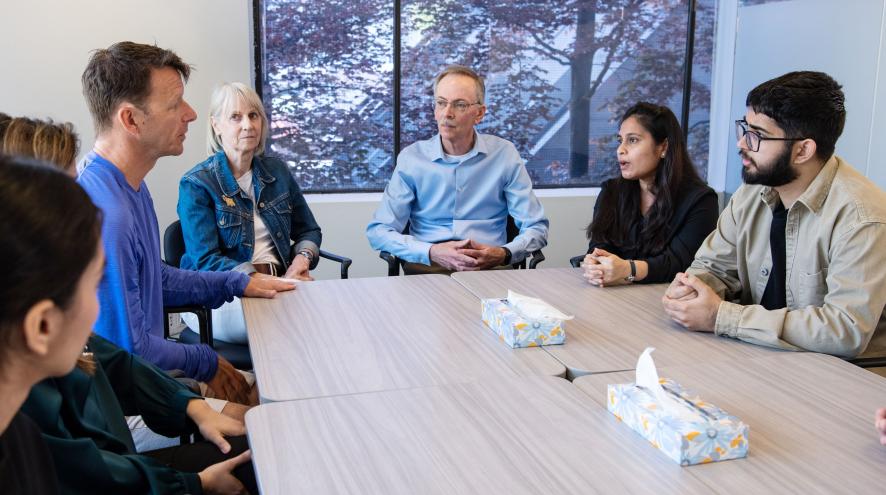Support groups
Dementia can leave those with the disease and their care partners feeling isolated. However, you are not alone. There are other people to share the journey with you. Learn about the Family Caregiver and Early Stage support groups we offer across B.C.

Caregiver support groups (in-person and online)
For people caring for someone living with the disease – spouses, parents, family or friends – a caregiver support group offers the chance to:
- Exchange information and friendship with others affected by dementia.
- Access the most current information provided by the Alzheimer Society of B.C.
- Learn and share practical tips for coping with change.
- Decrease feelings of loneliness and isolation.
- Express feelings and be reassured that these feelings are normal.
Online support groups for caregivers meet monthly for 90 minutes. You have the option to join by video or by phone. Regional and provincial groups are available across the province, including specialized groups for:
- Chinese families (Cantonese and Mandarin-speaking options available)
- South Asian families (Punjabi and Hindi-speaking)
- Adult children of a parent living with dementia
- Caregivers of a person living in long-term care
- Caregivers of a person living with young onset dementia
- Caregivers of a person living with behavioural variant frontotemporal dementia (bvFTD)
- Caregivers of a person living with Lewy Body dementia
- 2SLGBTQIA+ caregivers
For more information or to register for a online support group, please call the First Link® Dementia Helpline at 1-800-936-6033 or for a listing of upcoming programming, click here. for a list of days and times available.
Early-stage support groups for people living with dementia (in-person or online)
Having a diagnosis of Alzheimer’s disease or another dementia affects many areas of your life and people in this situation experience a variety of feelings.
The reality of the disease can make it difficult to stay in touch with friends and family and can lead to loneliness and isolation.
Peer groups can be:
- An opportunity to decrease feelings of isolation and loneliness.
- A place to express feelings and be reassured that these feelings are normal and expected.
- A place to find a positive outlook on things without being misunderstood.
- The chance to regain some control in the face of a disease that cannot be controlled.
- A place to find a sense of hope.
Early-stage support groups provide a place for people living with early symptoms of dementia to come together with others also living the dementia experience and discuss the impact of the disease, share stories, experiences and learn from one another about how to live well with dementia.
Why join an early-stage support group?
To discuss the impact of living with early symptoms of dementia by sharing:
- Experiences and learning from one another how to live as well as possible with dementia.
- Laughter and mutual understanding.
- Tips and strategies for coping with the many changes connected with the disease.
Online support groups for people living with dementia meet every second week for 60 minutes. You have the option to join by video or by phone.
Read about our other early-stage programs for people living with early symptoms of dementia: Coffee and Chat and Minds in Motion®
To learn more and find out if an early-stage group is the right fit for you, and what groups are available in your community, please call the First Link® Dementia Helpline at 1-800-936-6033 to register.
Information and Mutual Aid Model
Our support groups are based on an Information and Mutual Aid model. This means that you can expect to benefit from reliable information provided by Alzheimer Society staff, and from the wisdom and experience of other group members who are also facing the illness.
Read more about the Information and Mutual Aid Model.
